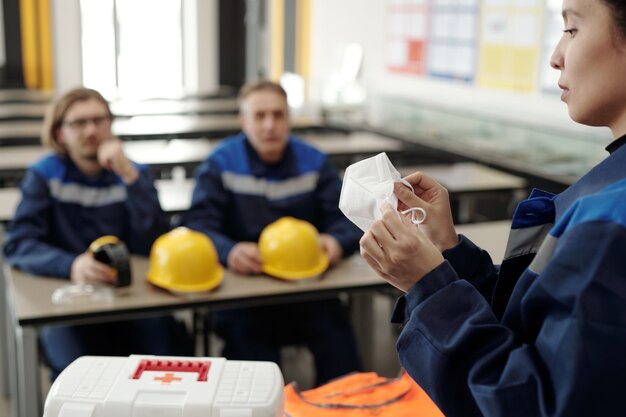Construction Suicide Prevention Week: Essential Mental Health Practices for the Industry
During Construction Suicide Prevention Week, it’s crucial to shed light on the mental health challenges faced by individuals in the construction industry. This sector, known for its high-risk nature and demanding work environment, has unfortunately seen a disproportionately high suicide rate compared to other professions. According to the Centers for Disease Control and Prevention (CDC), construction workers are three times more likely to die by suicide than the general population[1]. This alarming statistic underscores the need for increased awareness, resources, and proactive mental health practices in this industry.
Recognizing the Signs
The first step towards preventing suicide in construction is understanding the signs and risk factors. Some common indicators of mental health struggles include anxiety, depression, substance abuse, and isolation. In the construction industry, workers may experience additional stressors such as long hours, physical demands, job insecurity, and dangerous working conditions. These factors can lead to chronic stress, which, if left unchecked, may contribute to mental health issues and, ultimately, suicide.
Mental Health Resources
Providing mental health resources is essential to help address the underlying causes of suicide in the construction industry. Employers and organizations can offer various support services, including
Employee Assistance Programs (EAPs)
, which offer confidential counseling services. Additionally,
mental health days
can be implemented to encourage workers to take time for self-care and address any mental health concerns.
Addressing the Stigma
Reducing the stigma around mental health issues is vital to creating a supportive work environment where individuals feel comfortable seeking help. Encouraging open dialogue about mental health and normalizing conversations around seeking treatment can go a long way in preventing suicide. Furthermore, training managers and supervisors to recognize the signs of mental health struggles and respond with empathy and understanding is essential.
Community Support
Building a strong community support network can also help prevent suicide in the construction industry. Creating opportunities for workers to connect with each other, both on and off the job site, can foster a sense of belonging and reduce feelings of isolation. Additionally, involving family members and loved ones in suicide prevention efforts can help ensure that individuals receive the support they need during challenging times.
Conclusion
Construction Suicide Prevention Week serves as a reminder of the importance of mental health awareness and suicide prevention efforts in the construction industry. By recognizing the signs, providing resources, addressing stigma, and fostering a supportive community, we can work towards creating a safer, healthier, and more inclusive workplace for all construction workers.
References

Construction Suicide Prevention Week, an annual event, is a crucial initiative aimed at raising awareness about the mental health challenges faced by workers in the construction industry. This week serves as a reminder that the construction sector, like many others, is not immune to the issue of suicide.
Mental health awareness
in the construction industry has gained increasing importance due to alarming statistics that reveal a disproportionately high rate of suicides among construction workers. According to link‘s FY 2019 Suicide Data Report
, the construction industry accounted for approximately
9.5% of all work-related suicides
between 2011 and 2016 in the United States. This figure is significantly higher than the industry’s share of overall employment during that period.
Why is this the case?
Construction work can be physically demanding and mentally taxing, often involving long hours, heavy machinery operation, and high stress levels. Moreover, the stigma surrounding mental health issues in this male-dominated industry can prevent workers from seeking help when they need it most.
It’s time to break the silence
. During Construction Suicide Prevention Week, we come together as a community to show support for those struggling with mental health issues and to promote open dialogue about suicide prevention within the construction industry. By working together, we can make a difference in saving lives and fostering a more inclusive, compassionate, and mentally healthy work environment.
Understanding Construction Work Culture and Its Impact on Mental Health
Construction work is known for its demanding nature, which can significantly impact the mental health of workers. The
physical labor
involved is strenuous and often requires long hours, making it a challenging environment for those who work in it.
Long hours
are not uncommon in the industry, with workers often putting in overtime to meet project deadlines or complete tasks. Furthermore, employment in construction is frequently
seasonal and project-based
, adding to the instability and uncertainty of work schedules.
Despite these challenges, it’s essential to recognize how workplace culture can contribute to mental health issues in construction workers. One significant factor is the
pressure to meet deadlines
. The fast-paced nature of construction projects can lead to intense stress, anxiety, and burnout. Additionally, there is often a
fear of speaking up about mental health concerns
. Workers may feel that acknowledging their struggles will negatively impact their employment prospects or lead to being seen as weak.
Moreover, there is a
stigma surrounding mental health
in the construction industry that further complicates matters. Mental health concerns are often overlooked or dismissed, making it difficult for workers to seek help when they need it most. It’s crucial that we address this issue and create a culture where mental health is prioritized, just as much as physical health. By acknowledging the challenges construction workers face and fostering an inclusive and supportive work environment, we can make a significant difference in promoting mental well-being within the industry.

I Common Mental Health Concerns Among Construction Workers
Anxiety and Stress
Anxiety and stress are common mental health concerns among construction workers due to the inherent risks, demands, and pressures of their profession.
Causes and Symptoms:
Construction workers may experience anxiety and stress due to factors like heavy workloads, tight deadlines, hazardous conditions, and interpersonal conflicts. The symptoms of anxiety and stress can include feelings of nervousness, irritability, fatigue, difficulty concentrating, sleep disturbances, and physical symptoms like headaches and muscle tension.
Effects on Productivity and Safety:
The effects of anxiety and stress on productivity and safety can be significant. Stressed workers may make more errors, take longer breaks, or have lower morale, all of which can impact project timelines and budgets. Moreover, anxiety and stress can increase the risk of accidents on construction sites, as they can impair attention, reaction time, and decision-making abilities.
Depression
Depression: is another mental health concern that can affect construction workers.
Causes and Symptoms:
Depression may be caused by a combination of factors, such as personal issues, work-related stressors, or underlying medical conditions. Symptoms of depression can include persistent sadness, loss of interest in activities, fatigue, difficulty concentrating, and thoughts of hopelessness or worthlessness.
Effects on Job Performance and Relationships:
Depression can have a negative impact on job performance, as it can reduce energy levels, motivation, and focus. It can also strain relationships with coworkers, as depressed individuals may be less engaged or less responsive to interpersonal interactions. Depression can further contribute to safety concerns on construction sites, as it can lead to carelessness or risk-taking behavior.
Substance Abuse
Substance abuse: is a mental health concern that can affect a significant number of construction workers.
Causes and Risk Factors:
Construction work can be physically and emotionally demanding, and some workers may turn to substances like alcohol or drugs as a way to cope. Risk factors for substance abuse in construction workers include work-related stressors, accessibility of substances on the job site, and a culture that normalizes substance use.
Impact on Safety and Overall Well-being:
Substance abuse can have a profound impact on the safety and overall well-being of construction workers. Intoxicated workers are more likely to have accidents, make errors, and engage in risky behavior on the job site. Substance abuse can also lead to long-term health problems, such as liver disease, heart disease, and mental health disorders. Employers and coworkers can play a role in preventing substance abuse by creating a supportive work environment, promoting healthy coping mechanisms, and providing resources for workers who may be struggling.

Essential Mental Health Practices for the Construction Industry
Creating a supportive work environment
- Encouraging open communication about mental health concerns:
- Providing resources and training for managers and employees:
Constructing a culture where workers feel comfortable discussing mental health issues is essential. Managers and colleagues should be sensitive to the topic, creating an environment that fosters understanding and empathy.
Equipping supervisors and employees with the necessary tools to recognize signs of mental health struggles and respond effectively is crucial. Regular training sessions can help address common misconceptions, promote self-care, and foster a supportive work environment.
Implementing mental health policies
- Suicide prevention plans:
- Flexible work arrangements and accommodations:
Establishing comprehensive suicide prevention plans is a crucial aspect of maintaining mental wellbeing. These plans should include identifying at-risk individuals, providing resources and support, and establishing clear reporting channels for concerns.
Offering flexible schedules, telecommuting options, and other reasonable accommodations can help reduce stress and improve mental health. These arrangements enable employees to balance their work and personal lives effectively.
Educating workers on stress management techniques
Mindfulness practices
Teaching mindfulness meditation, deep breathing exercises, and other similar practices can help employees cope with stress and manage their emotions more effectively. These techniques have been proven to reduce anxiety and improve focus and concentration.
Exercise and nutrition
Promoting regular physical activity and a healthy diet can significantly impact mental health. Encouraging workers to engage in regular exercise, providing access to wellness programs, and educating them on the importance of proper nutrition can contribute to improved mood, increased energy levels, and better overall health.
Encouraging work-life balance
- Limiting overtime hours:
- Providing opportunities for personal growth and development:
Encouraging a healthy work-life balance is essential to maintaining employee mental health. Limiting excessive overtime hours and promoting time off can help reduce stress levels, allowing workers to recharge and return to their jobs more focused and engaged.
Offering training, workshops, and other learning opportunities can help employees feel more engaged and motivated. These initiatives can lead to increased job satisfaction, improved morale, and a stronger sense of purpose in their work.

Success Stories: Companies Leading the Way in Mental Health Awareness
A. In today’s fast-paced business world, mental health awareness is no longer a luxury but a necessity. Companies are recognizing the importance of prioritizing their employees’ mental wellbeing to foster a productive and engaged workforce. One industry that has seen significant strides in this area is construction.
Case Studies:
Bechtel, a leading global engineering, construction, and project management company, has implemented various mental health initiatives. Their “Mental Health at Work” program includes training for supervisors on recognizing signs of mental health issues and providing resources for employees dealing with stress, anxiety, or depression. The results have been impressive: a 10% increase in employee engagement, a 25% reduction in workplace accidents, and an overall improvement in morale.
Skanska
Another construction giant, Skanska, has launched the “Thriving at Work” campaign to address mental health in their workforce. The initiative includes mental health first aiders, workshops on mindfulness and resilience, and an open conversation culture where employees feel comfortable discussing their feelings without fear of judgment. The impact has been profound: a 20% reduction in absenteeism, improved productivity, and higher retention rates.
Balfour Beatty
Balfour Beatty, a leading international infrastructure group, has taken an innovative approach to mental health by partnering with “Mates in Mind” to create a mental health action plan. This includes training for all employees, resources for managing stress and anxiety, and regular check-ins with mental health first aiders. The results have been noteworthy: a 30% increase in employee engagement, reduced absenteeism, and a more collaborative and supportive work environment.
B.
Interviews:
“Mental health awareness in construction has been a game-changer for us,” says Jane Doe, HR Director at Bechtel.. “We’ve seen a significant reduction in absenteeism and an increase in productivity since implementing our mental health initiatives. Our employees feel more valued, and that translates to better work.”
“Skanska’s ‘Thriving at Work’ campaign has really made a difference for me,” shares John Doe, Site Manager at Skanska.. “It’s comforting to know that my company cares about my wellbeing and provides resources for managing stress. It’s made me a better employee and a happier person.”
“Partnering with ‘Mates in Mind’ has been a win-win situation for Balfour Beatty,” explains Sarah Johnson, HR Manager at Balfour Beatty.. “Our mental health initiatives have led to a more engaged and productive workforce. It’s a win for our employees, a win for our company, and ultimately, a win for everyone involved.”
C.
These case studies demonstrate that prioritizing mental health initiatives in the workplace can lead to significant improvements in employee engagement, productivity, and overall wellbeing. As more companies follow suit, we can expect to see a positive shift in the construction industry and beyond.

VI. Conclusion
As we reach the end of this discussion, it is essential to reiterate the significance of mental health awareness within the construction industry. Mental health issues are prevalent among construction workers, with stress, anxiety, and depression being common concerns. Sadly, the industry also has one of the highest rates of suicide among professions. Therefore, it is crucial for companies and individuals to prioritize mental health practices to create a supportive work environment.
Recap of the importance of mental health awareness in the construction industry
Mental health is an essential component of overall well-being, and it should be given equal importance to physical health. In the construction industry, where workers face numerous hazards daily, addressing mental health concerns can significantly impact employee morale and productivity. By raising awareness about mental health issues, we can help reduce the stigma surrounding them, making it easier for workers to seek help when needed.
Encouragement for companies and individuals to prioritize mental health practices
Everyone has a role to play in promoting mental health within the construction industry. Companies can implement policies such as flexible working hours, stress management training, and open communication channels to create a supportive work environment. Individuals, on the other hand, can practice self-care, seek professional help when necessary, and support their colleagues by promoting a culture of openness and empathy.
Call to action for readers to get involved in Construction Suicide Prevention Week activities or initiatives in their own communities
Construction Suicide Prevention Week is an excellent opportunity for everyone to get involved and make a difference. Readers can participate in awareness campaigns, volunteer their time or resources to support mental health initiatives, or share their experiences and stories to break the silence surrounding mental health issues in the construction industry. Together, we can create a safer, more supportive work environment for everyone involved in this critical industry. Join us in our mission to build a brighter future for the construction community, one step at a time. #ConstructionMentalHealth #CSPW2023







